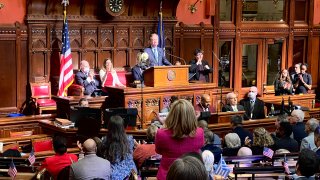
Gov. Ned Lamont presented his budget address to the General Assembly Wednesday, outlining plans for his two-year budget.
In recent weeks, the governor has revealed some of his legislative proposals.
You can see the budget plan here.
Here are some details on what Lamont has said he wants to do:
Get New England news, weather forecasts and entertainment stories to your inbox. Sign up for NECN newsletters.
Income Tax Rate Cuts
On Monday, Lamont announced plans for the state’s first personal income tax rate reduction since 1996.
The proposed rate changes are predicted to benefit about 1.1 million of the state’s 1.7 million tax filers, according to the Democratic governor.
U.S. & World
Connecticut’s personal income tax has seven tax brackets, with rates ranging from 3% to 6.99%. The rates are marginal, affecting income up to a certain amount.
Currently, a single filer pays a 3% tax on their first $10,000 of adjusted gross income and a 5% tax on income up to $50,000.
Under Lamont’s plan, the 3% percent rate would be permanently lowered to 2% beginning with the 2024 income year, while the 5% rate would drop to 4.5%.
For married couples filing jointly, the new 2% rate would apply to their first $20,000 of adjusted gross income and the 4.5% rate would apply to income up to $100,000.
Lamont estimated some joint filers could save almost $600 and some single filers could save nearly $300, depending on their adjusted gross income.
Lamont has already announced plans to permanently increase the state’s refundable state earned income tax credit for low-to-moderate-income working individuals from 30.5% of the federal credit to 40% and fully restore the “pass-through entity tax credit” that helps business owners avoid the federal government’s $10,000 cap on state and local tax deductions.
Tax Credit for Small Businesses
Among the governor's tax proposals, he announced a plan to increase in business tax credits and said they are vital to the state’s economy.
Lamont announced plans to restore the pass-through entity tax credit, which would allow small business owners to get a larger tax credit on their personal returns.
Canceling Medical Debt
Lamont said he wants to use $20 million in federal COVID-19 recovery funds from the American Rescue Plan Act legislation to cancel overdue medical debts for thousands of Connecticut residents who he said are struggling to pay their bills.
His administration estimates that a $20 million investment has the potential to eliminate about $2 billion in medical debt for Connecticut residents.
Gun Legislation
Lamont has also released plans for gun legislation.
He wants to raise the age to legally buy a long gun from 18 to 21, which is the age requirement for buying handguns. And he is proposing to increase first-offense penalties for illegally possessing large-capacity ammunition magazines from a misdemeanor carrying a $90 fine to a felony carrying up to five years in prison and up to a $5,000 fine.
Lamont also announced gun legislation that includes a ban on open carrying, said his latest proposals are aimed at preventing mass shootings in a state that already has some of the toughest gun laws in the country, many of them passed in the months after the 2012 massacre at Sandy Hook Elementary School in Newtown that killed 20 children and six educators.
Lamont wants to add several new categories of firearms to the state’s assault weapons ban. The proposal would require owners of such firearms to register them with the state, then ban future sales and purchases after the registration period ends.
The categories of guns that would be added to the ban after the registration period include AR-15-style rifles made before the state’s ban took effect in 1994. Officials said gun dealers in other states have been shipping so-called pre-ban firearms to Connecticut for sale at high prices.
The governor is scheduled to address a joint session of the General Assembly Wednesday at noon.



